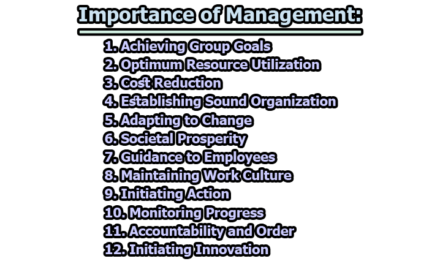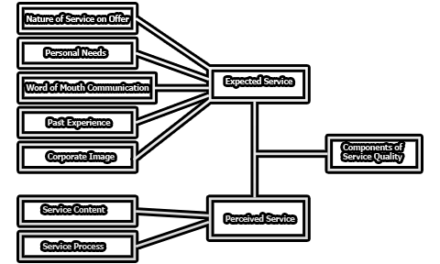Nature and Scope of Management:
Management is the process of planning, organizing, leading, and controlling resources to achieve organizational goals and objectives efficiently and effectively. It involves coordinating various activities, making decisions, and guiding individuals and teams toward accomplishing desired outcomes. Management is an essential function in any organization, whether it’s a business, nonprofit, government agency, or even a household. It provides direction, structure, and purpose to achieve optimal results. In this article, we will explore the nature and scope of management.
Nature of Management:
The nature of management encompasses the fundamental characteristics and principles that define the role and functions of management within an organization. It reflects the dynamic and ever-evolving nature of management in response to changing business environments, societal trends, and technological advancements. Several key aspects contribute to the nature of management:
1. Universal Application: Management principles are universally applicable across various industries, sectors, and types of organizations. Regardless of the field, whether it’s manufacturing, healthcare, education, or entertainment, the core principles of management remain consistent. This universality is due to the fundamental nature of management, which focuses on achieving objectives, allocating resources, and coordinating activities effectively.
2. Goal-Oriented: The central purpose of management is to achieve specific organizational goals and objectives. Managers work strategically to ensure that all efforts are aligned with these goals. They set targets, measure progress, and make necessary adjustments to reach these objectives efficiently.
3. Process-Oriented: Management is not a one-time activity; it’s an ongoing and cyclical process. The management process typically includes four functions: planning, organizing, leading, and controlling. These functions are interconnected and sequential, forming a continuous loop that guides an organization’s activities.
- Planning: Managers set goals, outline strategies, and create action plans to achieve objectives. They analyze the current situation, forecast future trends, and make decisions that guide the organization’s direction.
- Organizing: Managers arrange resources, define roles, and establish a structure that facilitates efficient work processes. This involves designing an organizational hierarchy, assigning responsibilities, and ensuring effective communication.
- Leading: Leadership involves inspiring and motivating employees to work towards the organization’s goals. Managers guide, support, and empower their teams to achieve high levels of performance and productivity.
- Controlling: Managers monitor performance, compare it to established standards, and take corrective actions when necessary. Controlling ensures that the organization stays on track and deviations from plans are addressed promptly.
4. Influence and Authority: Managers possess varying degrees of authority and influence within an organization. Their level of authority is determined by their position in the hierarchy. Top-level managers have more strategic authority, while middle-level managers have authority over specific functions or departments. Front-line managers exercise authority over day-to-day operations.
5. Adaptability: The business environment is constantly evolving due to technological advancements, market fluctuations, and changes in consumer preferences. Effective managers are adaptable and responsive to these changes. They adjust strategies, adopt new technologies, and make timely decisions to keep the organization competitive.
6. Problem-Solving and Decision-Making: Managers are problem solvers. They encounter various challenges, such as resource constraints, competition, and changes in market demand. Effective managers analyze situations, identify root causes, and make informed decisions that align with the organization’s goals and values.
7. Interdisciplinary Nature: Management draws insights from diverse fields such as psychology, sociology, economics, and communication. Understanding human behavior, economic principles, market dynamics, and cultural influences helps managers make well-rounded decisions.
8. Human-Centered: At its core, management involves working with people. Managers are responsible for leading teams, motivating employees, resolving conflicts, and creating a positive work culture. Effective interpersonal skills and the ability to understand and address the needs of employees are essential for successful management.
9. Ethical Considerations: Ethics play a vital role in management. Managers must make decisions that align with ethical standards and social responsibilities. They consider the impact of their choices on employees, stakeholders, and society as a whole.
Scope of Management:
The scope of management refers to the wide range of activities, responsibilities, and areas of operation that fall under the purview of managers. It encompasses various functions and tasks that managers perform to achieve organizational objectives:
a. Planning: Planning involves setting organizational goals, creating strategies to achieve them, and outlining the steps required to execute those strategies. It encompasses setting objectives, forecasting, resource allocation, and determining timelines for various projects and initiatives.
b. Organizing: Organizing involves arranging resources, both human and non-human, to ensure the efficient attainment of organizational goals. Managers design structures, establish reporting relationships, and allocate responsibilities to create a smooth workflow.
c. Leading: Leading encompasses providing direction, guidance, and inspiration to employees. Managers act as role models, communicate expectations, and create a work environment that encourages creativity, collaboration, and high performance.
d. Controlling: Controlling ensures that activities are consistent with the established plans and standards. Managers monitor performance through various metrics, assess results, and take corrective actions when necessary to ensure that the organization stays on track.
e. Coordinating: Coordination involves harmonizing the efforts of different departments, teams, and individuals to avoid duplication of efforts and promote synergy. Effective coordination enhances efficiency and minimizes conflicts.
f. Decision-Making: Decision-making is a core function of management. Managers analyze information, evaluate alternatives, and make choices that impact the organization. Decision-making ranges from routine operational decisions to strategic choices that shape the organization’s future.
g. Communication: Effective communication is essential for managers to convey goals, expectations, changes, and feedback within the organization. Managers also listen to employee concerns and facilitate transparent communication channels.
h. Human Resource Management: Human resource management involves recruitment, hiring, training, and development of employees. Managers create an inclusive work environment, ensure fair compensation, and provide opportunities for career growth.
i. Innovation and Change Management: Managers promote innovation by encouraging creative thinking and exploring new ideas. They also lead the organization through changes by ensuring smooth transitions, minimizing resistance, and maximizing the benefits of change initiatives.
j. Ethical Considerations: Managers make decisions that uphold ethical standards and corporate social responsibility. They ensure that the organization’s actions are aligned with ethical values and societal expectations.
k. Risk Management: Managers assess risks associated with various decisions and actions and develop strategies to mitigate them. Effective risk management minimizes potential negative impacts on the organization.
l. Strategic Management: Strategic management involves setting long-term goals, crafting strategies, and allocating resources to achieve competitive advantage and sustainable growth. Managers analyze the competitive landscape, identify opportunities, and make strategic choices that position the organization for success.
m. Financial Management: Managers are responsible for financial planning, budgeting, cost control, and resource allocation. Financial management ensures the organization’s financial health and sustainability.
n. Marketing Management: Marketing managers develop strategies to promote products or services, analyze market trends, identify target audiences, and create campaigns that resonate with customers.
o. Operations Management: Operations managers oversee the production process, optimize resource utilization, and ensure the efficient delivery of products or services to customers.
p. Corporate Social Responsibility: Managers consider the organization’s impact on the environment, society, and stakeholders. They develop strategies to ensure responsible business practices and contribute positively to the community.
q. Entrepreneurship and Innovation: Managers foster a culture of entrepreneurship and innovation by encouraging employees to generate new ideas, explore opportunities, and drive the organization’s growth through creative solutions.
r. Globalization and International Management: In a globalized world, managers need to navigate cross-cultural challenges, expand markets, and manage operations across borders. International management involves understanding cultural nuances, legal frameworks, and economic factors in different regions.
In conclusion, the nature of management embodies the core principles that underpin the practice of management, while the scope of management encompasses the extensive range of functions and responsibilities that managers undertake to achieve organizational goals. Understanding both the nature and scope of management is essential for effectively leading and guiding organizations toward success in a rapidly changing and interconnected world.
Frequently Asked Questions [FAQs]:
What is the nature of management?
The nature of management refers to the fundamental characteristics and principles that define the role and functions of management. It includes aspects such as goal orientation, adaptability, problem-solving, decision-making, interdisciplinary knowledge, and the focus on people. Management is a dynamic process that involves planning, organizing, leading, and controlling to achieve organizational objectives.
Why is the universality of management principles significant?
The universality of management principles implies that these principles are applicable across various industries and organizations. This significance lies in the fact that managers can draw on established management concepts and practices regardless of their specific field, helping them make informed decisions and drive organizational success.
How does management adapt to changes in the business environment?
Management’s adaptability stems from its dynamic nature. Managers respond to changes in technology, market trends, and societal shifts by adjusting strategies, adopting new practices, and making decisions that keep the organization competitive. This ability to adapt is crucial for maintaining relevance and sustainability.
How does management foster ethical considerations?
Ethical considerations are integral to management decisions. Managers must ensure that their choices align with ethical standards and societal expectations. They assess the impact of their decisions on stakeholders, employees, and the community, making ethical integrity a core aspect of effective management.
What is the primary goal of management?
The primary goal of management is to achieve organizational objectives and goals. Managers work strategically to coordinate resources, guide employees, and make decisions that align with these objectives. Effective management ensures that an organization’s efforts are directed toward its mission and vision.
How does management contribute to employee development?
Management plays a significant role in employee development by providing training, mentorship, and opportunities for growth. Managers identify employee strengths and areas for improvement, offer feedback, and create an environment that fosters continuous learning and advancement.
What is the significance of communication in management?
Communication is crucial in management as it enables managers to convey goals, expectations, changes, and feedback within the organization. Effective communication promotes understanding, collaboration, and a positive work environment, enhancing productivity and employee satisfaction.
How do management and leadership intersect?
Management and leadership are interconnected concepts. While management focuses on planning, organizing, and controlling, leadership involves inspiring and guiding teams to achieve goals. Effective managers often exhibit strong leadership qualities, striking a balance between administrative tasks and motivating their teams.
What are the main functions of management?
The main functions of management are planning, organizing, leading, and controlling. Planning involves setting goals and strategies. Organizing entails arranging resources. Leading involves guiding and inspiring employees. Controlling focuses on monitoring and adjusting activities to ensure goal attainment.
How does the interdisciplinary nature of management contribute to its effectiveness?
The interdisciplinary nature of management draws insights from various fields, allowing managers to understand diverse aspects of organizational dynamics. Knowledge of psychology helps in understanding human behavior, economics aids in resource allocation, and sociology informs effective communication and team collaboration.
What are the challenges that managers face in the modern business environment?
Managers in the modern business environment face challenges such as rapid technological advancements, globalization, changing consumer preferences, and the need for sustainable practices. These challenges require managers to be adaptable, innovative, and skilled in navigating complex scenarios.
How do managers balance their various roles and responsibilities?
Managers balance their roles by prioritizing tasks, delegating responsibilities, and managing time effectively. They must also foster teamwork, trust, and open communication within their teams to ensure that all functions are aligned and executed efficiently.
How does management contribute to organizational success?
Management contributes to organizational success by ensuring that resources are allocated efficiently, strategies are aligned with goals, employees are motivated, and risks are managed effectively. Effective management enhances productivity, innovation, and the organization’s ability to adapt to changes.
How do management principles apply to different industries?
Management principles are broad concepts that can be adapted to suit the specific needs and challenges of different industries. While the context may vary, the core functions of management, such as planning, organizing, leading, and controlling, remain applicable and guide decision-making in various sectors.
How does management play a role in fostering innovation?
Management fosters innovation by encouraging creative thinking, providing resources for experimentation, and creating an environment that supports risk-taking. Effective managers empower employees to generate new ideas, explore solutions, and drive continuous improvement within the organization.

Library Lecturer at Nurul Amin Degree College










